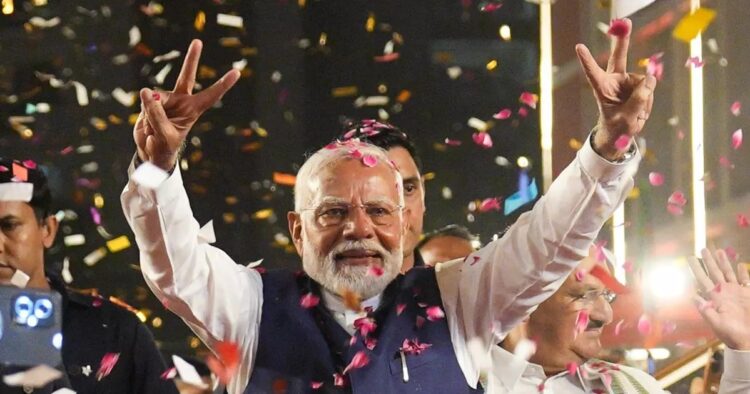Ahead of his third term inauguration, Prime Minister Narendra Modi was elected as the National Democratic Alliance (NDA) Parliamentary Party leader, emphasizing the crucial role of consensus in governing the country.
Speaking at the NDA Parliamentary Party meeting, Modi stressed the necessity of consensus alongside the majority to ensure the nation’s development. He highlighted the responsibility to leave no stone unturned for the betterment of the country.
Modi outlined his priorities, aiming to swiftly fulfill the aspirations of the common people and expedite development processes. With a vision to elevate India to the third-largest economy globally within the next decade, he underscored the importance of decisive actions and rapid progress.
In addition, Modi emphasized the significance of good governance, development, and enhancing citizens’ quality of life in the coming years.
Acknowledging the concerns of the middle and upper-middle classes, Modi pledged to minimize government interference, aiming to expedite the realization of people’s aspirations. He also praised the grassroots-level work of NDA allies, emphasizing the organic growth of the coalition and the need for synergy between regional and national aspirations for comprehensive development.
Modi reiterated the inclusive ethos of the NDA, citing its presence in diverse regions, including tribal-dominated states and the Northeast. He underscored the alliance’s commitment to respecting all religions, exemplified by its governance in areas with significant Christian populations.
Reflecting on the recent electoral victories, Modi hailed the NDA as synonymous with good governance and lauded its success in various regions, including Southern Bharat. Despite not securing seats in certain states, he highlighted the coalition’s growing support base and expressed confidence in its future prospects.
Moreover, Modi praised the historical success of the NDA, spanning three decades since the era of Atal Bihari Vajpayee. He emphasized the alliance’s dedication to national interests and portrayed it as a catalyst for the nation’s progress.
NDA allies endorsed Modi’s leadership, with leaders like N Chandrababu Naidu and Nitish Kumar expressing confidence in his ability to lead India towards prosperity. As negotiations for the next government continued, allies positioned themselves for crucial Cabinet berths, reflecting the intricate dynamics within the coalition.
The BJP’s shortfall in securing a majority necessitated coalition-building efforts, with allies such as the TDP and JD(U) asserting their demands for ministerial berths and special status for their respective states. The evolving political landscape underscores the complexities of governance and the imperative of consensus-driven leadership for inclusive development.
Modi’s reaffirmation of consensus-based governance and the NDA’s commitment to holistic development sets the stage for his third term, signaling a renewed focus on accelerating Bharat’s progress while navigating the intricacies of coalition politics.

















Comments